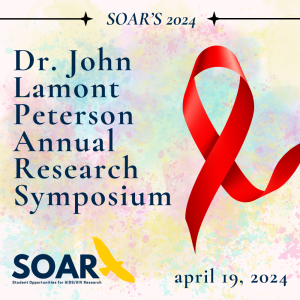The Dr. John Lamont Peterson Annual Research Symposium 2024

-
Lisa Bowleg, Ph.D., MA, Professor of Applied Social Psychology, Department of Psychological and Brain Sciences, The George Washington University, and Founder & President, Intersectionality Training Institute
-
Myla Lyons (SOAR '23), PhD Student, Applied Social Psychology, The George Washington University

The annual Dr. John Lamont Peterson Annual Research Symposium is the culminating event for participants in the Student Opportunities for AIDS/HIV Research (SOAR) program. The symposium features a keynote by Dr. Lisa Bowleg (The George Washington University) and presentations by SOAR scholars who share findings from their behavioral and social science research related to HIV and/or sexual and gender minority populations.
Keynote: Want to Be a Future HIV Prevention and Treatment Researcher? You’re Going to Need to Get Critical
Speakers: Lisa Bowleg, Ph.D., MA,Professor of Applied Social Psychology, Department of Psychological and Brain Sciences, The George Washington University, and Founder & President, Intersectionality Training Institute, and Myla Lyons (SOAR '23), PhD Student, Applied Social Psychology, The George Washington University
Critical theories — think, intersectionality, critical race theory, structural racism, for example — are those that expose, interrogate, and challenge power by highlighting the social, structural, political, and economic determinants of health. Critical approaches offer a stark contrast to the primarily individualistic, biomedical, psychosocial theories and frameworks that still dominate most doctoral social and behavioral science programs. With a handful of exceptions, people’s thoughts, beliefs, attitudes, and behaviors about HIV testing, condom use, PrEP, and HAART adherence remain the primary focus of doctoral-level HIV education. Structural and political determinants of health, and the constraints they impose on the ability of groups historically marginalized at multiple intersections (e.g., racialized/ minoritized, sexual and/or gender minority, and low SES) to engage in health promoting behaviors are rarely a focus of doctoral training. But they should be. The indomitable Audre Lorde admonished that the “Master’s tools will not dismantle the Master’s house.” This is also true of conventional approaches to HIV prevention and treatment research. More than four decades into the HIV epidemic and despite PrEP and HAART, HIV still disproportionately affects Black and Latino gay, bisexual, and other men who have sex with men, transgender and nonbinary people, and Black and Latina women who have sex with men. These intersectional HIV inequities spotlight a dire need for a more critical approach to Ending the HIV Epidemic, than the conventional theoretical approaches used thus far. This talk will address what it means to get critical about HIV prevention and treatment research, some strategies for doing so, and why SOAR students should consider critical and structural perspectives to be essential to their future HIV research careers.
Schedule:
10am: Welcome & Intros
10:30-12pm: Keynote Talk
12pm: Lunch
12:30-1:30pm: Student Poster Session (in person only)
1:30-3:30pm: Student Oral Presentations
3:30-4:30 pm: Graduation & Awards
This symposium is free and open to the public. Portions of the symposium will be streamed on Zoom. Register here!
Student Presenters:
- Isabella Bonnewit
- Ava Burzycki
- Rafael Cortes
- Feaven Gebrezgi
- Hadas Kluger
- Maddy Ligon
- Kaitlene Poblete
- Saige Porter
- Anita Shubert
Student Poster Session:
- Lauren Burnside
- Ciarán Conlin
- April Hamilton
- Micah Hopkins
- Rebecca Pulliam
- Kylie Rice
- Anthony Sanchez
Accessibility:
We are asking all attendees to avoid wearing fragranced personal products (like perfume or scented lotions) to accommodate attendees with fragrance allergies. Thank you for making this event more inclusive to all.
Ramp & Elevator Access at Palmer Commons: Use the South entrance, across from the Undergrad Science Building. From the South entrance, turn left, through the door, elevator is on the right. The symposium will be held on the 4th Floor.
